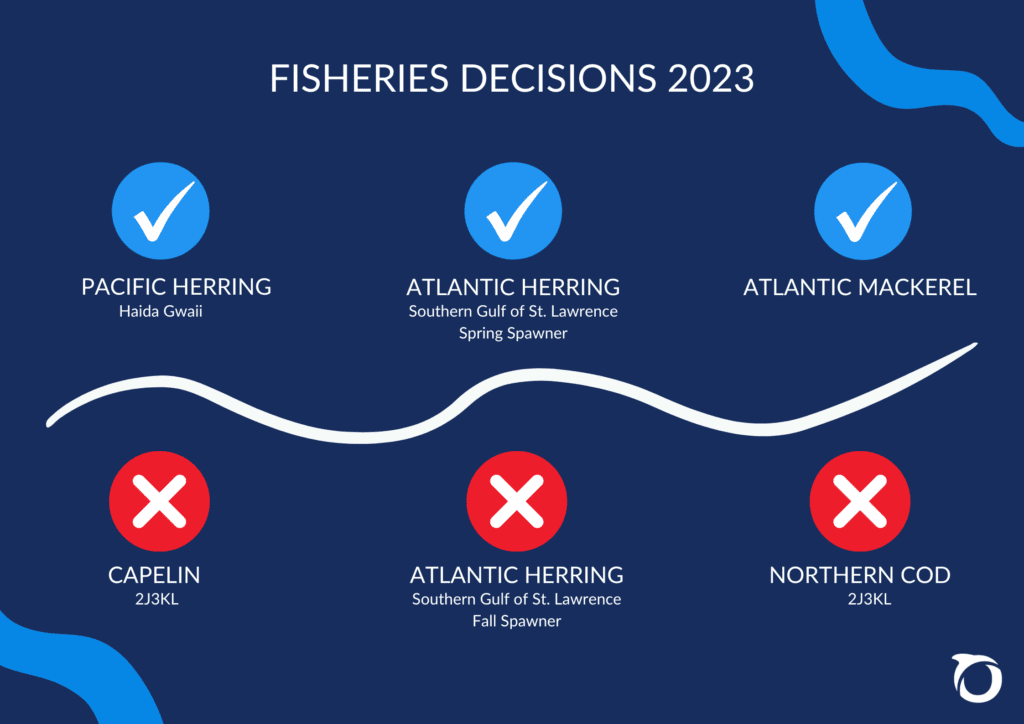August 2, 2023
DFO’s 2023 wild fishery quota decisions don’t line up with rebuilding mandate
Estimated reading time: 0 minutes
BY: Rebecca Schijns
Topics: Rebuild Ocean Abundance
Summer is here and with it comes much of the fishing season across the Atlantic and Pacific Coasts. Ships are heading out to harvest the seafood many of us enjoy; an activity with social, cultural and economic impacts that can be felt across the country.
The lead up to this year’s fishing season highlights some troubling trends and blatant inconsistencies from the Canadian government. Some depleted wild fish populations have been managed to support rebuilding them and others have been left to be overfished.
Here’s a look at some of Fisheries and Oceans Canada (DFO)’s recent key marine fisheries decisions. Blue circles represent the ones that followed scientific advice to support rebuilding and red ones show decisions that failed to do this.

Delayed decisions
Before the boats go out to harvest, Canada’s Fisheries Minister sets an annual quota for each fishery that determines how much can be fished that season. The process of setting fishery quotas involves consultations with stakeholders, including Indigenous groups, fishing industry representatives, scientists, and environmental organizations. The goal is to balance the sustainable use of marine resources while ensuring the long-term health and viability of fish populations and ecosystems. Given how important these decisions are, it’s critical that they be made in a timely way. However, this year DFO was significantly delayed for many important stocks. The quota for Atlantic forage fish, including mackerel and capelin, is usually announced in the spring but this year it came in late June, with no clarity on why there was a delay, or even when information could be expected.
The year of the roll-over
In good fisheries management, annual quotas must be informed by the best available scientific data, including the current size of the population, compared against healthy levels, and other considerations about the larger ecosystem. They must also be informed by policy and law. Canada’s amended Fisheries Act outlines that if a population is depleted, decisions must support rebuilding it back to healthy levels. There are a few examples, such as capelin and fall herring in the Southern Gulf of St. Lawrence, where DFO did not follow these considerations in 2023 and instead chose to roll over decisions from last year, despite newer evidence advising against this. This means that these populations may continue to be knowingly overfished, working in direct opposition to the government’s rebuilding commitments.
Capelin:
The Minister maintained the same decision as last year for capelin in northeast Newfoundland and Labrador, which feeds other fish and marine life as well as supporting the economy, tourism and culture. The quota sets 14,533 tonnes to be harvested –higher than this critically depleted population can support. Simply put, it’s government-sanctioned overfishing.
Cod:
Another example of defaulting to last year’s decisions is with northern cod, a population that has technically been under a fishing moratorium for the last three decades. The Minister announced a quota of 12,999 tonnes for the stewardship fishery, rolling over last year’s decision and again failing to follow DFO’s own science and policy to rebuild this population.
Other forage fish:
In addition to capelin, other forage fish decisions were rolled over, and this important group of species had widely inconsistent management approaches from coast to coast. For example, fisheries closures were maintained for depleted forage fish such as some Pacific herring stocks and Atlantic mackerel. Meanwhile fishing pressure remains too high for other depleted forage fish including capelin and Atlantic herring in the Southern Gulf of St. Lawrence (fall spawners).
Call for transparency
Fisheries decisions should be transparent, predictable, based on the best available evidence and informed by government policy and Canadian law. When decisions about our oceans are made in the dark, the results too often benefit some parts of the big fishing industry to the detriment of ocean health and small-scale community harvesters.
Oceana Canada has been calling out these fisheries decisions, highlighting concerns and identifying that increased transparency would help address some of these issues. Share this blog with your community to help raise awareness about this year’s key fisheries decisions.
MOST RECENT
April 24, 2025
March 6, 2025
February 3, 2025
January 22, 2025
Celebrating New Beginnings in 2025: Four Right Whale Calves Spotted Off Florida Coast

